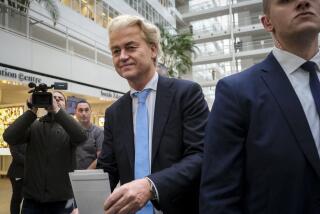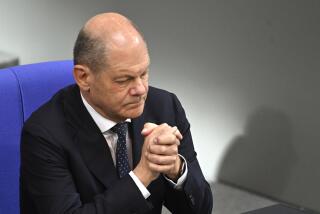Traffic jams top the list of grievances in one German state heading into Sunday’s election

In a country where speed is sacred and being late a sin, the specter of ever-worsening traffic jams in Germany’s most populous state has emerged as a major campaign issue ahead of a key regional election Sunday.
The infuriating congestion on freeways where BMWs, Mercedes and Porsches could legally roar along at more than 100 mph might cost the North Rhine-Westphalia’s liberal governor, Hannelore Kraft, her job.
“The traffic mess is definitely the biggest problem in the state at the moment,” said Anna-Lena Zeckai, 32, a fashion consultant in Cologne whose once daily 35-minute commute from Siegburg has turned into an hour-long ordeal. “It’s quite possible that Kraft is going to lose because of traffic.”
Whatever happens to Kraft, a member of the center-left Social Democratic Party, in Sunday’s vote is considered by many observers as an important indicator of what may occur in the national election in September.
The Social Democrats’ national leader, Martin Schulz, former president of the European Parliament, has been seen as a serious challenger to Chancellor Angela Merkel of the center-right Christian Democratic Union. A Kraft loss could help boost Merkel, who became chancellor in 2005 and is seeking a fourth term.
Kraft, who became governor in 2010 and had been popular, is fighting for her political life in the industrial northwestern state that is ordinarily a bastion for Social Democrats. The party has ruled the state 46 of the last 51 years thanks to the considerable clout of local labor unions and the myriad working-class voters.
Nearly 18 million people live in the state, home to four of the country’s nine largest cities, including Cologne and Duesseldorf, as well as 10 million cars. The number of cars has jumped by more than 1 million since 2011, though the population has remained steady, and the number of construction sites has risen dramatically.
Local residents say Kraft’s standing locally has taken a beating largely because of the “Verkehrsstaus,” or traffic jams, that are clogging the Autobahns, many of which have no speed limit at all, that crisscross her state.
“When they’re stuck in a traffic jam, most Germans are not rationally thinking to themselves, ‘Oh well, everyone around me got caught up in bad traffic, too,’ but their first thought is, ‘Why the hell didn’t the lousy government do a better job and build a better four-lane freeway here?’” said Thomas Jaeger, a political scientist at Cologne University.
Jaeger said traffic exasperation could cost the Social Democrats dearly Sunday.
“Because taxes are so high in Germany, people expect the government to take care of just about everything for them — including making sure there the traffic keeps moving,” he said.
The election campaigns in Germany’s 16 states are usually centered on issues such as local schools, crime or day-care problems.
An opinion poll by the Forsa polling institute published Thursday found that 42% of respondents in North Rhine-Westphalia said the traffic problem was one of the main reasons quality of life in the state had deteriorated in the last 10 years. The poll also found that 55% of respondents expected the new state government to improve the traffic situation.
“The governor is responsible for all poor planning and lack of coordination on highway construction sites that is a main reason for the problems,” said Christoph Schachtner, 54, a managing director of a major footwear retail operation who needs 80 minutes for what used to be a 45-mile commute in 45 minutes from Cologne to Duisburg.
“It’s the governor’s job to make sure people can get to work, and in a state dependent on people being mobile, you need an efficient transport network, while ours isn’t working as it should because of misguided policies,” Schachtner said.
A German motorist association went to the trouble of tallying the total number of recorded traffic jams in the last year — 218,000, an increase of 20% from 2015. That’s an average of about 600 notable jams in the state every day in 2016. The total mileage of traffic backed up in North Rhine-Westphalia last year stretched to 242,500 miles, or more than double the 100,625 miles recorded in 2012.
The local leader of the Christian Democrats, Armin Laschet, blamed Kraft, and Merkel told a rally in Muenster: “If you could add up those 242,500 miles of traffic jams in NRW last year, it would be as long as a traffic jam stretching all the way to the moon and beyond.” The average distance between the Earth and moon is about 238,857 miles.
Karsten Kubow, a student who commutes each day from Dortmund to Cologne, said it takes him about 2 1/2 hours to get to classes, which is more than twice as long as it would normally take if there were no traffic delays.
“If traffic is bad and you’re late, most people aren’t going to show much understanding. They expect you to adjust and plan better, and leave even earlier,” Kubow said. “It feels like I’m always getting stuck in traffic. It feels like many of the construction sites just never get finished and new ones are popping up all the time.”
Kirschbaum is a special correspondent.
More to Read
Start your day right
Sign up for Essential California for news, features and recommendations from the L.A. Times and beyond in your inbox six days a week.
You may occasionally receive promotional content from the Los Angeles Times.






